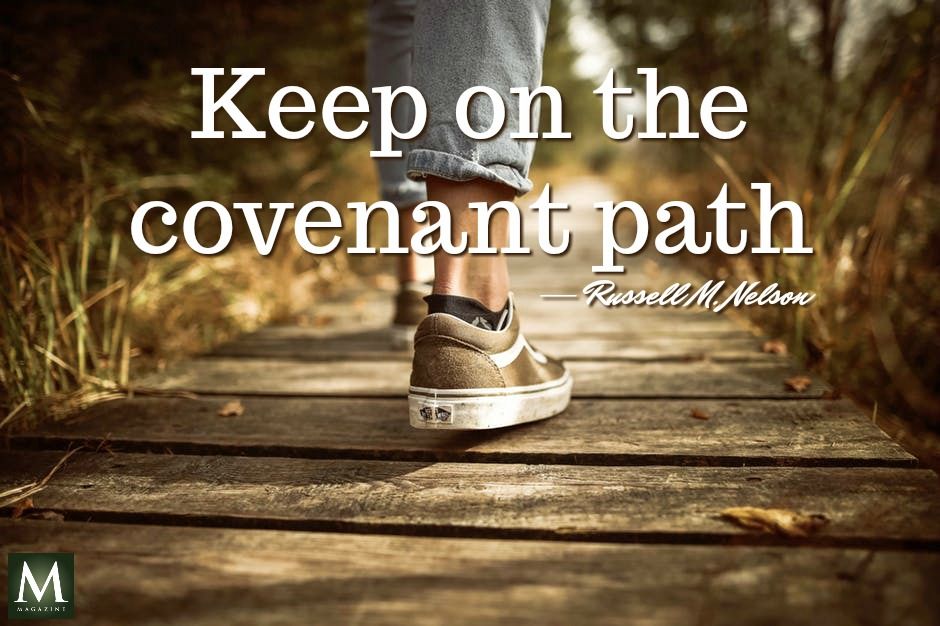 No term to date has been more associated with the leadership tenure of President Russell M. Nelson than “Covenant Path.” It’s become ubiquitous in his and many other church leader messages, and it now also rolls easily off the tongues in LDS stakes, wards, and other conversations. It’s an intriguing term, yet to date, it seems to Mormon Matters host Dan Wotherspoon and his friend and fellow close church watcher Mark Crego that it hasn’t been explored as widely and deeply as it might. Right now, in its current usage, comes across primarily a goal to be accomplished—”make and keep covenants, and if you stray, return to the covenant path”—with a promised reward at the end: eternal life (with all its inherent meanings when understood in full Latter-day Saint context). In that sort of presentation, walking the covenant path feels very “transactional.” Do this, receive that.
No term to date has been more associated with the leadership tenure of President Russell M. Nelson than “Covenant Path.” It’s become ubiquitous in his and many other church leader messages, and it now also rolls easily off the tongues in LDS stakes, wards, and other conversations. It’s an intriguing term, yet to date, it seems to Mormon Matters host Dan Wotherspoon and his friend and fellow close church watcher Mark Crego that it hasn’t been explored as widely and deeply as it might. Right now, in its current usage, comes across primarily a goal to be accomplished—”make and keep covenants, and if you stray, return to the covenant path”—with a promised reward at the end: eternal life (with all its inherent meanings when understood in full Latter-day Saint context). In that sort of presentation, walking the covenant path feels very “transactional.” Do this, receive that.
To Dan and Mark, however, the idea of both “covenant(s)” and “path(s)” are very rich concepts, and in this two-part episode they share what they consider to be larger and more ennobling visions of what this simple phrase might mean were we as Godwrestlers and faith journeyers to keep revisiting this term and allow its symbolism and sensibilities to grow along with us as we continue to walk our spiritual paths. Among other things, this episode covers: What are Mormonism’s seven primary covenants that make up the “covenant path”? What is their relationship to each of us individually and our relationship with God, however we define that term, but also (and perhaps even more importantly) as members of a religious or community? What roles do symbols and ritual markers of covenanting play in human lives, and can we allow our understanding of such things to become ever expanding and empowering? As LDS rhetoric about the covenant path is still in its infancy, how might each of us learn to understand it and teach of its richness with far more power than we currently do and see/hear from those around us?
Please listen in! We’d also love your comments and ideas to become part of the ongoing conversations at mormonmatters.org! Please share!
_____
Links:
Mark Crego, “The Covenant Path,” paper he wrote and posted in a private FB group in October 2018
“The Living Nature of Mormon Covenants,” Mormon Matters episode, April 2017.
Featuring: Charles Randall Paul, Jennifer Finlayson-Fife, and Joseph Stanford


Comments 2
I too have felt irritation and discomfort with ‘stay on the covenant path.” Thanks for putting words and explanation to my feelings. The irritation for me is the underlying formulaic understanding of that phrase, that it is about the ‘do’ rather than the ‘become.’ I still don’t like the phrase and would not use it.
I always enjoy both of your thinking and expression. Thank you.
Thanks, CLH.
In retrospection on this podcast, my sense is that we’ve only talked about half of it. I think there is a dark side of the Covenant Path, where one enters into a “covenant” without full knowledge of what the covenant entails, and then, later, must make cascading covenants to continue to be faithful to the original covenant. This becomes a kind of psychological entrapment.
When a person enters the temple, there is little to no prior education as to what kind of covenants s/he is going to be making. These covenants include obedience (without limit), sacrifice of life in defending the church, and giving/consecrating all that one has to the Church. Additionally, one is placed under covenant not to disclose these covenants to others (or at least, the tokens and signs of said covenants), thus making it impossible for someone to discuss before hand the significance of their commitment, and the, afterwards, to contemplate the extent to this commitment with anyone.
Then, later in life, a person is asked to do something by a church leader. It could be a calling, or it could be supporting a political proposition. IF that calling or proposition goes against one’s better judgment, the church leader can, by virtue of the covenants made in the temple, remind the person that they are under covenant to obey, sacrifice, and consecrate all that they have to the Church.
This happened in the case of Proposition 8 in California. Church leaders specifically invoked language that echoed LDS covenants regarding the Law of Consecration: “We ask that you do all you can to support the proposed constitutional amendment by donating of your means and time to assure that marriage in California is legally defined as being between a man and a woman.” Endowed members of the Church were thus required by their prior covenant to support this political proposition. It didn’t matter whether the individual member supported the proposition — once under covenant, the terms and conditions of the covenant apply.
I believe we can, as members of the Church, apply the teachings of the leaders in a way that doesn’t entrap or bind people to that which they do not understand. But it is difficult, because there are so many messages that bind us to what Gordon B Hinckley called “uncompromising loyalty” to the Church and its leaders. (GBH:”Loyalty”, April, 2003).
Our goal can be here to find a way to make these teachings make sense in a more universalizing, mature faith; but I do think it’s extremely difficult.